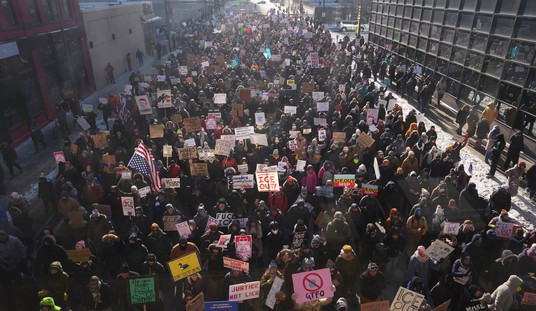Yep, says Philip Klein. I hope he’s right, but I’m not sure the takeaway from a blowout win for Trump in New Hampshire is that it’s now Ted Cruz’s race to lose.
Though Trump’s victory in New Hampshire was no doubt impressive, the electorate of independent voters and super high turnout was tailor-made for him, whereas Cruz didn’t put substantial effort into winning the state — where very conservative candidates don’t typically do as well. He is currently in position to win third here, with votes still outstanding.
As the race moves to South Carolina, however, Cruz has a ground game in place and the electorate is much more tailored to his strengths…
Furthermore, in Iowa, Cruz had to fend off Ben Carson, Mike Huckabee and Rick Santorum, who were all competing for similar voters. Carson received 9 percent in Iowa, and though Huckabee didn’t perform well, he did serve as an anti-Cruz attack dog to evangelicals. Now, Huckabee and Santorum are out, and Carson enters South Carolina greatly hobbled…
[N]ow that the field has narrowed down and Trump has won a primary and proven himself a serious threat, there will be a lot more focus on his liberal record — on abortion, guns, healthcare, property rights — among other issues.
Let’s look at this short-term and longer-term. Short-term, Klein’s right about South Carolina being way more favorable to Cruz than New Hampshire was. It’s hard to believe that the guy who won Iowa based on his strength with evangelicals, who’s already distinguished himself for having an outstanding ground game, is going to finish any worse than second in a state where evangelicals make up a huge segment of the electorate. (That’s also why it’s hard to believe a Rubio comeback, which would require a strong third place at a minimum, is in the offing. Cruz is in his way.) No one will be surprised if Cruz wins there on February 20th. But … no one will be surprised if Trump wins there either, right? Klein is correct that all of the polls showing Trump with a big lead in SC were taken before Cruz won Iowa, but they were also taken before Trump blew out the field in New Hampshire last night. Trump built his lead in the SC polls at a moment when it was still an open question whether he was nothing but media hype, a guy who was getting by on name recognition and camera time whose voters would evaporate into thin air once they were required to actually go out and vote. Trump put that to rest last night. Now he’s headed into South Carolina with new credibility as a potential nominee and, in all likelihood, a poll bounce. I can buy that some evangelicals in South Carolina are going to shift to Cruz by dint of his win in Iowa. I can, however, also buy that some South Carolinians who held off on expressing their support for Trump before, whether out of embarrassment or simply because they thought his candidacy would fizzle early, are going to shift to Trump. The first polls in SC this week should show a tighter race than they showed in January but there’s every reason to think Trump will still lead. And unlike Cruz, Trump doesn’t need to worry as much about voters in his “lane” defecting to Rubio as he scrapes for a comeback. It’s quite possible that Trump wins narrowly in SC because a few too many evangelicals wanted to give Marco a second chance at Cruz’s expense.
Related to that, don’t forget that Trump so far has been competitive among evangelical voters, a bloc which you might assume would belong exclusively to Rubio and Cruz. Cruz did win decisively among evangelicals in Iowa, which probably accounted for the margin of his victory, but Trump finished tied with Rubio for those voters. Last night in New Hampshire, Trump (narrowly) won evangelicals along with virtually every other demographic. It could be that Cruz repeats his Iowa performance with born-again voters in South Carolina, but as I say, it could also be that some portion of the electorate that was skeptical of Trump — evangelicals included — will be newly open to considering him after his big win. If Cruz wins evangelicals narrowly in SC and Trump wins non-evangelicals comfortably, how would you expect the outcome of that race to go? And all of this assumes that the advantage Cruz got from his ground game in Iowa will also obtain in South Carolina. Team Trump is no doubt trying to catch up organizationally there, but even if you think there’s no chance they’ll succeed, consider that Kasich and Bush and Rubio also surely had organizational advantages over Trump in New Hampshire. How’d that work out? I can’t remember who said it, but someone on Twitter noted last night that the most terrifying thing about the NH results for anti-Trumpers is that he actually outperformed his polls by four points. It may be that Trump will continue to struggle to match Cruz in turning out voters in caucus states but that statewide primaries will even the playing field. South Carolina is, of course, a primary state.
But all of that is near-term. Even if Cruz wins South Carolina and outperforms Trump in the SEC primary, how does the rest of the race look? WaPo posted this graphic this morning as evidence of Cruz’s strength, but there’s good reason here not to count Trump out too:

Lots of evangelicals waiting for Cruz in the south, to be sure. But … not nearly as many outside the south, which is a big problem, no? The whole point of last night’s outcome is that, in states where born-again Christians are less of a factor, Trump can blow out the competition. Well, there are lots of states like that — and lots of them will vote after March 15th, when delegates can be awarded winner-take-all instead of proportionally. Cruz supporters, and I include myself here, seem to be following an “underpants gnome” blueprint to ultimate victory that runs something like this:
Step one: Cruz beats Trump in Iowa, South Carolina, and in the SEC primary
Step two: ????????
Step three: Cruz is nominee!
Really? What happens when it really is a two-man race and, say, California and New York and other blue/purple states have to choose between the conservative fire-breather Cruz and the “moderate” deal-making centrist Trump? Cruz fans seem to be counting on dealing Trump enough losses that he simply gets demoralized and drops out at some point, but one of the huge consequences of last night’s result, I think, is that there’s much less of a chance of that now. Trump losing in Iowa and New Hampshire and South Carolina and Nevada really might have convinced him to throw in the towel in the name of saving face, but now that he’s proved he can roll to a landslide in a purple state, he has every incentive to take his lumps in the south and bide his time for a true “Trump vs. Cruz” binary choice in the rest of the country. And that assumes that Cruz really does win big in the south, where he’s expected to. Trump has consistently outpolled him there so far. Maybe that changed after Iowa. But, thanks to New Hampshire, maybe it didn’t. We’ll know soon.
I’d give Trump something like a 60 percent chance at the nomination at this point and Cruz a 35 percent chance (which means PredictWise is underrating both of them). How ironic, though, that it’s probably going to fall to Ted Cruz, establishment bete noire, to save the GOP from Trump. Even more ironic: Establishmentarians will fight him the whole way.








Join the conversation as a VIP Member